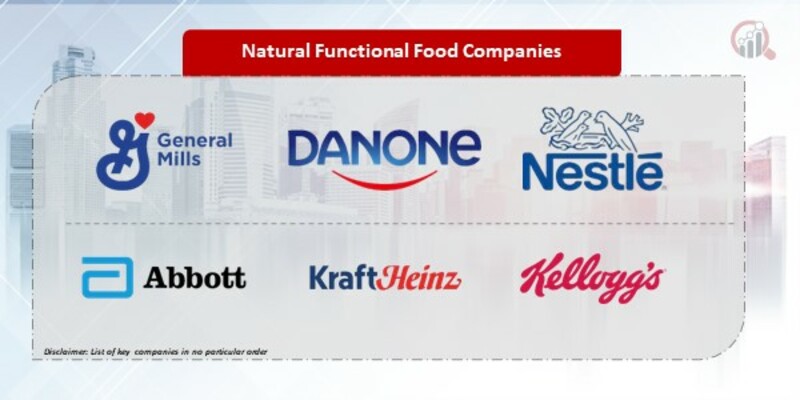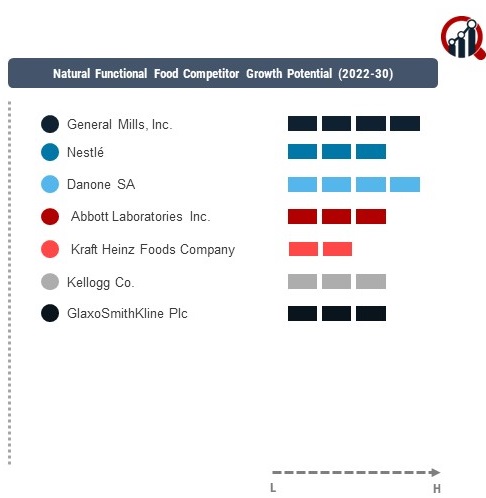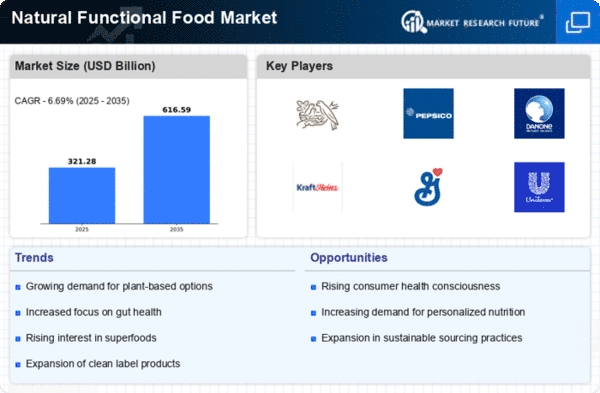Top Industry Leaders in the Natural Functional Food Market

The Natural Functional Food Market is witnessing unprecedented growth as consumer preferences shift towards healthier lifestyles. The global market is becoming increasingly competitive, driven by the rising demand for natural and functional food products. This article delves into the competitive landscape of the Natural Functional Food Market, exploring key players, strategies, market share analysis factors, emerging companies, industry news, and current investment trends.
Key Players:
General Mills, Inc. (U.S.)
GlaxoSmithKline plc (U.K.)
Danone SA (France)
Nestlé (Switzerland)
Abbott Laboratories Inc. (U.S.)
Kellogg Co. (U.S.)
Kraft Heinz Foods Company (U.S.)
Strategies Adopted:
Market leaders are implementing various strategies to maintain their competitive edge. Product innovation remains a focal point, with companies investing heavily in research and development to introduce novel natural functional food products. Nestlé, for instance, has consistently launched products with added health benefits, such as probiotics and natural antioxidants, catering to the growing demand for functional ingredients.
Additionally, strategic partnerships and collaborations are becoming increasingly common. Companies are joining forces to leverage complementary strengths and expand their market reach. General Mills, for example, has entered partnerships with organic and natural food brands to strengthen its position in the natural functional food segment.
Factors for Market Share Analysis:
Market share analysis in the Natural Functional Food Market is influenced by several factors. Product quality, brand recognition, distribution channels, and pricing strategies play crucial roles in determining a company's market share. For instance, companies emphasizing transparency in ingredient sourcing and sustainable practices often gain consumer trust, contributing to increased market share.
Geographical presence also plays a vital role. Companies with a global footprint and the ability to adapt products to diverse cultural preferences gain a competitive advantage. Kellogg's, for instance, has successfully tailored its natural functional food offerings to suit regional tastes, contributing to its strong market presence across different continents.
New and Emerging Companies:
The Natural Functional Food Market is witnessing the emergence of innovative startups that focus on niche segments, catering to specific dietary needs and preferences. Companies like Beyond Meat and Impossible Foods have disrupted the market with plant-based protein alternatives, gaining popularity among consumers seeking sustainable and healthier options.
These emerging companies often capitalize on the demand for clean-label products, free from artificial additives and preservatives. They leverage digital marketing strategies and e-commerce platforms to reach a broader consumer base. The agility and adaptability of these new entrants pose a challenge to traditional market players, urging them to stay vigilant and responsive to changing consumer trends.
Industry News:
Ongoing industry developments continue to shape the competitive landscape of the Natural Functional Food Market. Regulatory changes and evolving consumer preferences are key drivers of news within the sector. For instance, the growing emphasis on sustainability and ethical sourcing has led many companies to revamp their supply chain practices, garnering positive attention from environmentally conscious consumers.
The industry has also seen collaborations between natural functional food companies and technology firms to enhance product traceability and transparency. Blockchain technology, in particular, is being explored to ensure the authenticity of claims related to natural and organic ingredients.
Current Company Investment Trends:
Investment trends in the Natural Functional Food Market reflect the industry's dynamic nature. Companies are allocating substantial resources to research and development, aiming to stay ahead in the race for innovation. This includes investments in advanced manufacturing technologies, enabling the production of natural functional foods with enhanced nutritional profiles.
Strategic acquisitions and mergers also characterize the investment trends, with companies seeking to expand their market presence and acquire specialized capabilities. Notable examples include Danone's acquisition of WhiteWave Foods, a move that bolstered Danone's position in the organic and plant-based food segments.
Overall Competitive Scenario:
The competitive scenario in the Natural Functional Food Market is a dynamic interplay of innovation, market reach, and consumer trust. Established players must continually adapt to changing consumer preferences, regulatory landscapes, and technological advancements to maintain their leadership positions. Simultaneously, emerging companies are disrupting traditional norms, pushing the industry towards greater sustainability and healthier product alternatives.
As the market continues to evolve, companies that prioritize transparency, sustainability, and nutritional efficacy will likely emerge as leaders. The Natural Functional Food Market is poised for further growth, driven by consumer awareness and the collective industry commitment to delivering healthier, more sustainable food options.
Recent News :
General Mills:
Announced plans to acquire a leading organic ingredient supplier, further bolstering their commitment to natural and sustainable sourcing for their functional food products.
Partnered with a fitness app to develop personalized meal plans featuring their natural functional food options, targeting health-conscious consumers.
Nestlé:
Launched a new plant-based protein powder enriched with essential vitamins and minerals, expanding their offerings for fitness enthusiasts seeking natural alternatives.
Collaborated with a food waste reduction organization to upcycle ingredients for use in their natural functional food products, promoting sustainability practices.
Danone:
Invested in a startup developing edible insects as a sustainable protein source, exploring potential future applications in natural functional foods.
Launched a subscription service for personalized probiotic supplements based on individual gut health needs, further tailoring their functional food offerings.
PepsiCo:
Acquired a popular kombucha brand, broadening their portfolio of fermented beverages within the natural functional food space.
Partnered with a leading chef to develop plant-based meals featuring PepsiCo's natural functional ingredients, showcasing their versatility in culinary applications.











